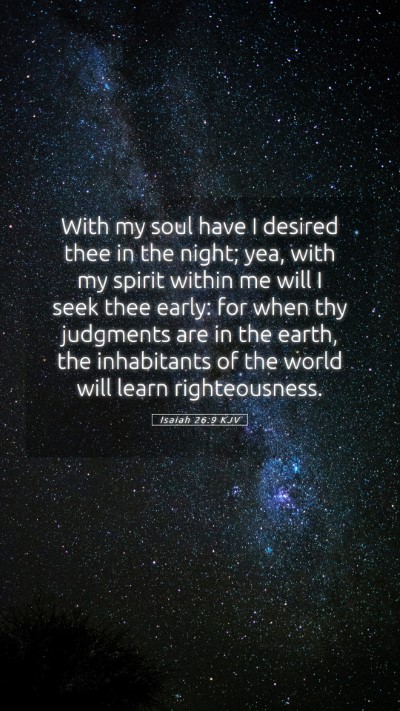Understanding Isaiah 26:9
Verse: Isaiah 26:9 - "With my soul have I desired thee in the night; yea, with my spirit within me will I seek thee early: for when thy judgments are in the earth, the inhabitants of the world will learn righteousness."
Summary of Biblical Meaning
This profound verse encapsulates the longing of the faithful for God, emphasizing both the desire for His presence and the importance of divine judgments for the moral education of humanity. The verse contrasts personal devotion with the broader implications of God's actions in the world.
Commentary Insights
Matthew Henry's Commentary
Matthew Henry reflects on the deep yearning for God, highlighting that such a desire is most fervent during times of darkness and personal distress. He suggests that genuine spiritual longing arises in the quietness of the night, emphasizing the significance of seeking God early, that is, at the dawn of understanding and in the anticipation of His will. The incorporation of 'judgments' points to the transformative power of God’s governance—those who witness His works are compelled towards righteousness.
Albert Barnes' Notes on the Bible
Albert Barnes emphasizes the earnestness of seeking God. He notes that the phrase "with my soul" implies a total commitment, indicating that the heart and spirit are engaged in this pursuit. Barnes further elaborates that the reference to "judgments" signifies both the nature of God’s actions in the world and the lessons humanity draws from them. Such judgments teach righteousness, guiding inhabitants towards moral principles that align with divine will.
Adam Clarke's Commentary
Adam Clarke posits that the night symbolizes periods of trial and disconnection from God, where the faithful must strive harder to seek solace and connection with their Creator. Clarke interprets the 'spirit within me' as a reference to the inner drive that compels individuals to pursue God, and he adds that as judgments manifest on earth, they serve a dual purpose: they instill fear and reverence but also lead to a deeper understanding of righteousness among people.
Significance of Key Phrases
- "With my soul have I desired thee in the night" - This expresses an intense yearning for God, particularly during hardships.
- "Early will I seek thee" - Indicative of an active and eager pursuit of God at the first opportunity.
- "For when thy judgments are in the earth" - This suggests that God’s governance is visible and impactful in the world, shaping humanity’s understanding of right and wrong.
- "Inhabitants of the world will learn righteousness" - This indicates that through divine actions, all of humanity has the potential to understand and adopt righteousness.
Applications
This verse encourages believers to cultivate a persistent yearning for God that transcends circumstances. The implications of seeking God and understanding His judgments are profound; they shape moral frameworks and challenge individuals to reflect on their own lives and choices.
Practical Applications:
- Engage in prayer and meditation during difficult times to foster a deeper relationship with God.
- Participate in Bible study groups to discuss the implications of divine judgments in contemporary life.
- Utilize Bible study tools for deeper insights into the nature of righteousness and how to pursue it.
- Apply the teachings of this verse in daily life to strive towards moral integrity and justice.
Cross References
- Psalm 63:1 - A declaration of seeking God early in the morning.
- Isaiah 54:13 - God's teaching leads to peace and righteousness.
- Micah 6:8 - What God requires is to act justly and love mercy.
Conclusion
Isaiah 26:9 serves as a profound reminder to strive for a deeper connection with God, especially during challenging times. Understanding this verse encompasses a rich analysis of personal devotion and communal moral understanding through the lens of divine judgment. By embedding such insights into our lives, we foster a greater appreciation for the meaning of Scripture and the call to righteousness within our own hearts and communities.


